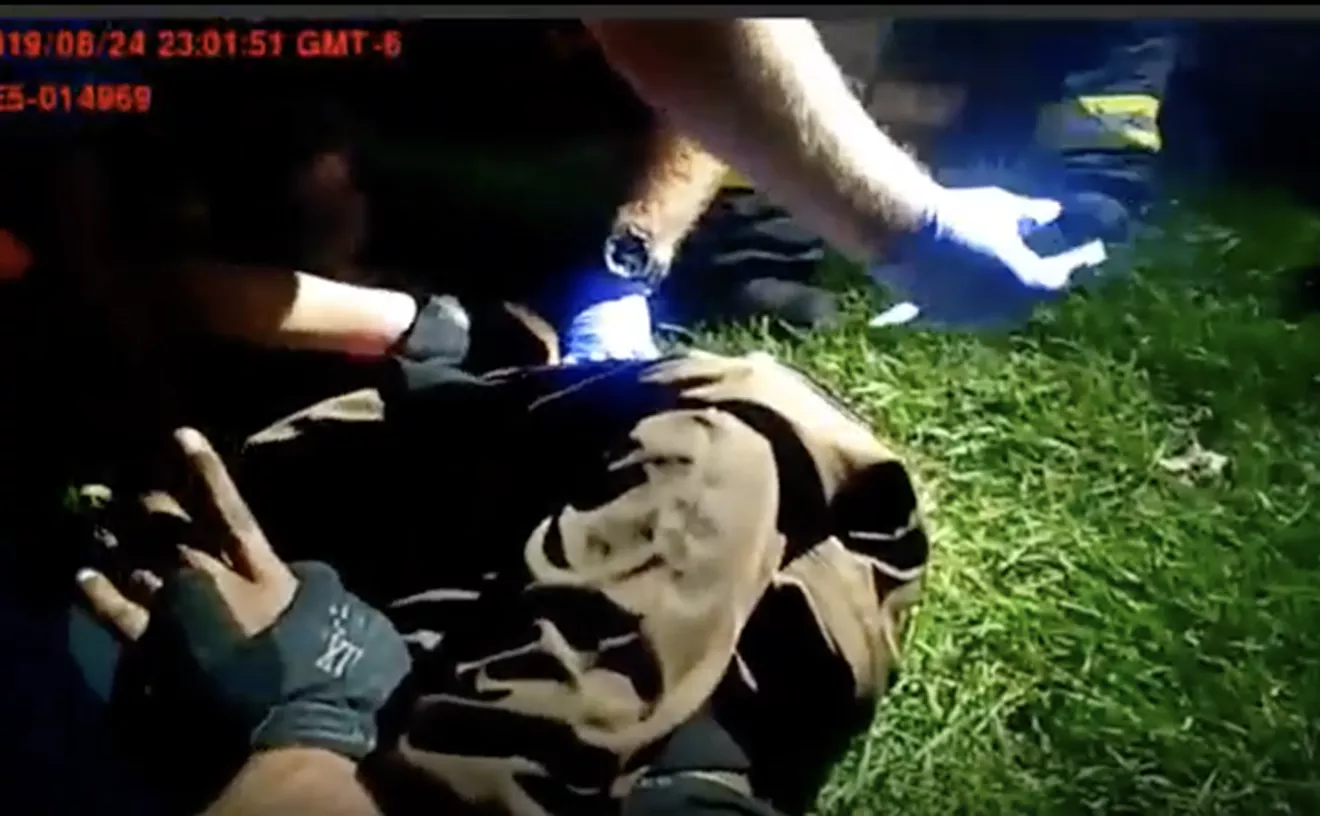At 9 a.m. today, July 13, Idaho Springs Police Officer Nicholas Hanning is scheduled to appear in Clear Creek County Court on a charge of third-degree assault related to his brutal arrest of Michael Clark, a 75-year-old who remains hospitalized six weeks after a bizarre attack.
Just shy of 11 p.m. on May 30, Hanning tased Clark — who had just put down a souvenir Hawaiian sword — causing a fall that's triggered a series of life-threatening medical crises. According to Clark's lawyer, Sarah Schielke of Loveland's The Life & Liberty Law Office, the entire incident was prompted by a dubious report from a neighbor who was beyond inebriated.
"She was so intoxicated that she could not give one version of the story that lined up with her previous one," says Schielke, who's also the attorney for the family of another elderly police excessive-force victim: 73-year-old dementia patient Karen Garner, whose rough bust after forgetting to pay for a few items at a Loveland Walmart led to criminal charges against the two cops involved. "She was virtually un-interviewable, to the point where officers had to go back to talk to her the next day — and she was still too drunk to be interviewed."
Schielke adds: "Based on her word, and with no warrant, officers barged into the home of this 75-year-old man who'd been sleeping moments before, then tased him — and now he may die as a result."
The interaction between Clark, Hanning and a second Idaho Springs Police Officer, Ellie Summers, was captured by body-worn cameras, yet the video hasn't been released — despite a law signed last week requiring that such footage be made public within 21 days of a request for the recording. "We are working with the court to determine when and how we can release the related body-cam footage," says John Bryan, public information officer for 5th Judicial District Attorney Heidi McCollum, whose agency is prosecuting Hanning. "We expect to have a hearing with the Clear Creek District Court judge soon, and that should give us a better timeline for its release."
That's not good enough for Schielke, who plans to ask about the video at today's hearing. She argues that issuing the clip "is completely discretionary on [McCollum's] part. She knows that Michael Clark may not live another minute, and despite that, she's saying, 'I want to wait until a judge weighs in on this,' and that's wrong."
On July 8, following the formal charging of Hanning, the Idaho Springs Police Department issued two press releases on the incident, and the 5th Judicial District DA's Office put out one of its own. All three statements note that a physical altercation occurred after Clark, wearing only his underwear, answered the door holding the sword — which Schielke sees as a thinly veiled attempt to imply that he got what he deserved.
Nothing could be further from the truth, she says. Based on accounts from Clark during brief periods of time when he's been lucid and an arrest affidavit she obtained prior to it being sealed by the court, here's how Schielke characterizes what went down:
"Michael started his day on May 30 putting American flags on the graves of fallen soldiers at Fort Logan cemetery. Then he came home to his apartment and went to bed. But suddenly, in the middle of the night, he was awakened by this huge slamming sound — a reverberation off the wall from the apartment next door. He sat up, banged on the wall and said, 'Knock it off.' The woman next door then banged on the wall and yelled a number of obscenities back at him. So he shook his head and tried to go back to sleep."
Shortly thereafter, Schielke continues: "Clark heard someone banging on the front door: Hanning and Summers, although he didn't know that, because they didn't identify themselves. All he knew is that the neighbors next door had been getting crazy, yelling cuss words at him, and now someone was hammering on his door. So he walked to the door and looked through the peephole, but he didn't see anything, because the officers had positioned themselves outside the door frame. So he didn't let them in, but the police banged again, still not identifying themselves."
At that point, Clark went to a nearby bookshelf and snatched what Schielke describes as a "collectible Hawaiian sword" about a foot in length, with shark teeth around its edges. "He's in his underwear and he doesn't have on his glasses, which he needs to see. When he opens the door, the officers point guns at him and yell at him to put the sword down," she says. "He sets the shark-tooth sword back on his shelf, and as he's turning around, Hanning kicks him."
Because the affidavit is currently sealed, Schielke declines to go into detail about what happened prior to Clark being tased. But she emphasizes that he was "unarmed and defenseless" at the time, and after being jolted, "he fell backwards, hit his head on a shelf and lost consciousness." Yet Hanning then "climbed on top of him, hit him in the head and applied pressure to his neck, choking him with either his knee or his arm," she maintains.
Shortly thereafter, Clark — who was never accused of a crime — was rushed to an area hospital, where his condition continues to be concerning. According to Schielke, he needs heart surgery, but doctors can't move forward with the procedure yet because of the risk of infection related to a burst appendix.
Tasers are often classified as less-than-lethal force, but that's not always the case, as witnessed by the death of Elbert County resident and veteran Matt Poer, the subject of a 2018 Westword feature. Schielke believes the taser use was even more problematic in Clark's case because of what she sees as two best-practices violations: the absence of a warning before the device was used and recommendations that it shouldn't be deployed against seniors unless the circumstances are extreme — "and this was an unarmed 75-year-old in his underwear."
Schielke sees comparisons between the Clark case and the injuries sustained by Loveland dementia patient Garner. "The main thing these two incidents share is that they are both the result of police believing that one box needs to be checked and then they can use whatever force they want," she says. "The fact that these were two at-risk, elderly people may or may not be a coincidence, but the bigger issue in these past few years has been the roll-out of body cameras at the same time there's been this ongoing militarization of police, and them still believing they don't need to change anything. When you have those things intersect with somebody who's inherently fragile, you have these horrible incidents."
Clark simply wants the video made public "so his friends, his family and his community can see the accurate story told, rather than only hearing the version that's being pitched by others," she says.
Idaho Springs Mayor Michael Hillman hasn't responded to an inquiry from Westword about the case. Click to read the first and second Idaho Springs Police Department press releases about Hanning, plus a related document from the 5th Judicial District DA's Office.

Audio By Carbonatix
[
{
"name": "Air - MediumRectangle - Inline Content - Mobile Display Size",
"component": "12017618",
"insertPoint": "2",
"requiredCountToDisplay": "2",
"watchElement": ".fdn-content-body",
"astAdList": [
{
"adType": "rectangle",
"displayTargets": "mobile"
}
]
},{
"name": "Editor Picks",
"component": "17242653",
"insertPoint": "4",
"requiredCountToDisplay": "1",
"watchElement": ".fdn-content-body",
"astAdList": [
{
"adType": "rectangleLeft",
"displayTargets": "desktop|tablet"
},{
"adType": "rectangleRight",
"displayTargets": "desktop|tablet|mobile"
}
]
},{
"name": "Inline Links",
"component": "18838239",
"insertPoint": "8th",
"startingPoint": 8,
"requiredCountToDisplay": "7",
"maxInsertions": 25
},{
"name": "Air - MediumRectangle - Combo - Inline Content",
"component": "17261320",
"insertPoint": "8th",
"startingPoint": 8,
"requiredCountToDisplay": "7",
"maxInsertions": 25,
"watchElement": ".fdn-content-body",
"astAdList": [
{
"adType": "rectangleLeft",
"displayTargets": "desktop|tablet"
},{
"adType": "rectangleRight",
"displayTargets": "desktop|tablet|mobile"
}
]
},{
"name": "Inline Links",
"component": "18838239",
"insertPoint": "8th",
"startingPoint": 12,
"requiredCountToDisplay": "11",
"maxInsertions": 25
},{
"name": "Air - Leaderboard Tower - Combo - Inline Content",
"component": "17261321",
"insertPoint": "8th",
"startingPoint": 12,
"requiredCountToDisplay": "11",
"maxInsertions": 25,
"watchElement": ".fdn-content-body",
"astAdList": [
{
"adType": "leaderboardInlineContent",
"displayTargets": "desktop|tablet"
},{
"adType": "tower",
"displayTargets": "mobile"
}
]
}
]












